Operations and Service Management Report: Business Success Factors
VerifiedAdded on 2023/06/10
|10
|2954
|58
Report
AI Summary
This report delves into the multifaceted realm of operations and service management, exploring core principles, practical applications, and strategic techniques essential for business success. It begins by defining operations and service management, emphasizing their roles in enhancing efficiency and customer satisfaction. The report then evaluates key theories and principles, including reality, organization, accountability, and change, and illustrates their implementation in both manufacturing and service industries. It assesses various operations management techniques, such as business process management, lean manufacturing, and supply chain management, highlighting their impact on capacity, quality, and supply chain optimization. Furthermore, the report examines the strategic use of technology in supply chain management, emphasizing its role in enhancing visibility, supplier management, and early warning systems. It also covers the implementation of diverse operations techniques, including process design, project management, and continuous improvement, and analyzes how supporting functions interact with operations to drive business success. The report concludes by underscoring the importance of these elements in achieving long-term organizational goals and fostering a competitive advantage.
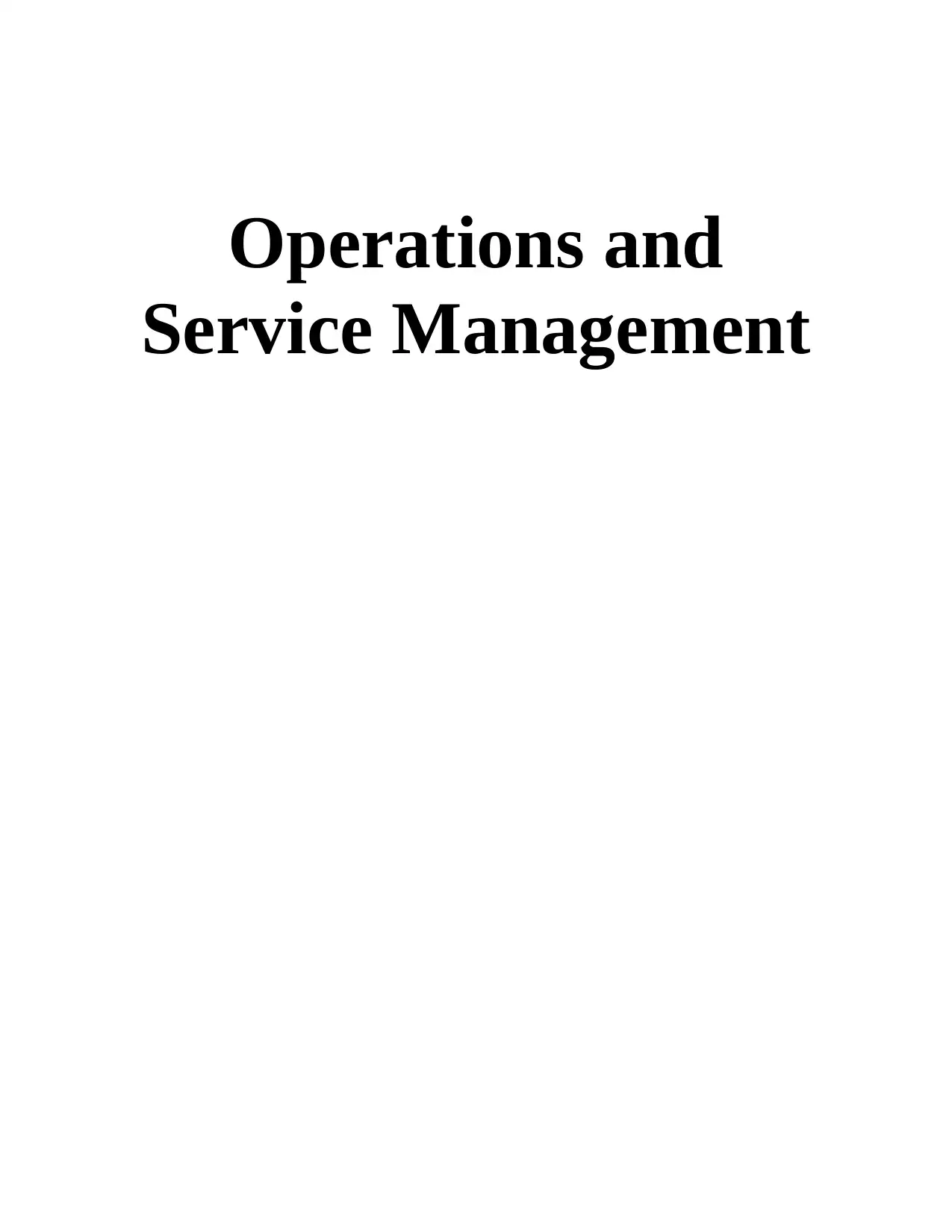
Operations and
Service Management
Service Management
Paraphrase This Document
Need a fresh take? Get an instant paraphrase of this document with our AI Paraphraser
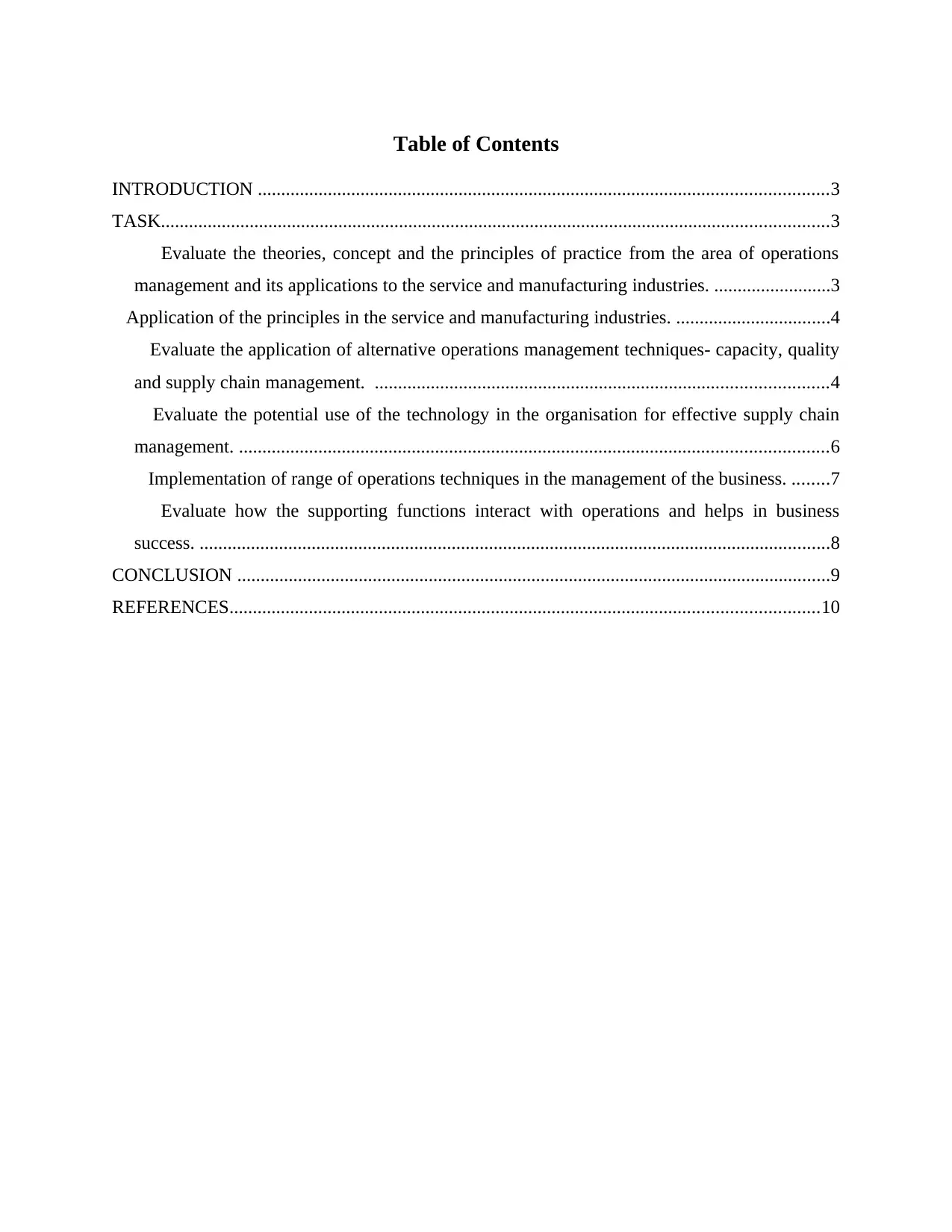
Table of Contents
INTRODUCTION ..........................................................................................................................3
TASK...............................................................................................................................................3
Evaluate the theories, concept and the principles of practice from the area of operations
management and its applications to the service and manufacturing industries. .........................3
Application of the principles in the service and manufacturing industries. .................................4
Evaluate the application of alternative operations management techniques- capacity, quality
and supply chain management. .................................................................................................4
Evaluate the potential use of the technology in the organisation for effective supply chain
management. ..............................................................................................................................6
Implementation of range of operations techniques in the management of the business. ........7
Evaluate how the supporting functions interact with operations and helps in business
success. .......................................................................................................................................8
CONCLUSION ...............................................................................................................................9
REFERENCES..............................................................................................................................10
INTRODUCTION ..........................................................................................................................3
TASK...............................................................................................................................................3
Evaluate the theories, concept and the principles of practice from the area of operations
management and its applications to the service and manufacturing industries. .........................3
Application of the principles in the service and manufacturing industries. .................................4
Evaluate the application of alternative operations management techniques- capacity, quality
and supply chain management. .................................................................................................4
Evaluate the potential use of the technology in the organisation for effective supply chain
management. ..............................................................................................................................6
Implementation of range of operations techniques in the management of the business. ........7
Evaluate how the supporting functions interact with operations and helps in business
success. .......................................................................................................................................8
CONCLUSION ...............................................................................................................................9
REFERENCES..............................................................................................................................10
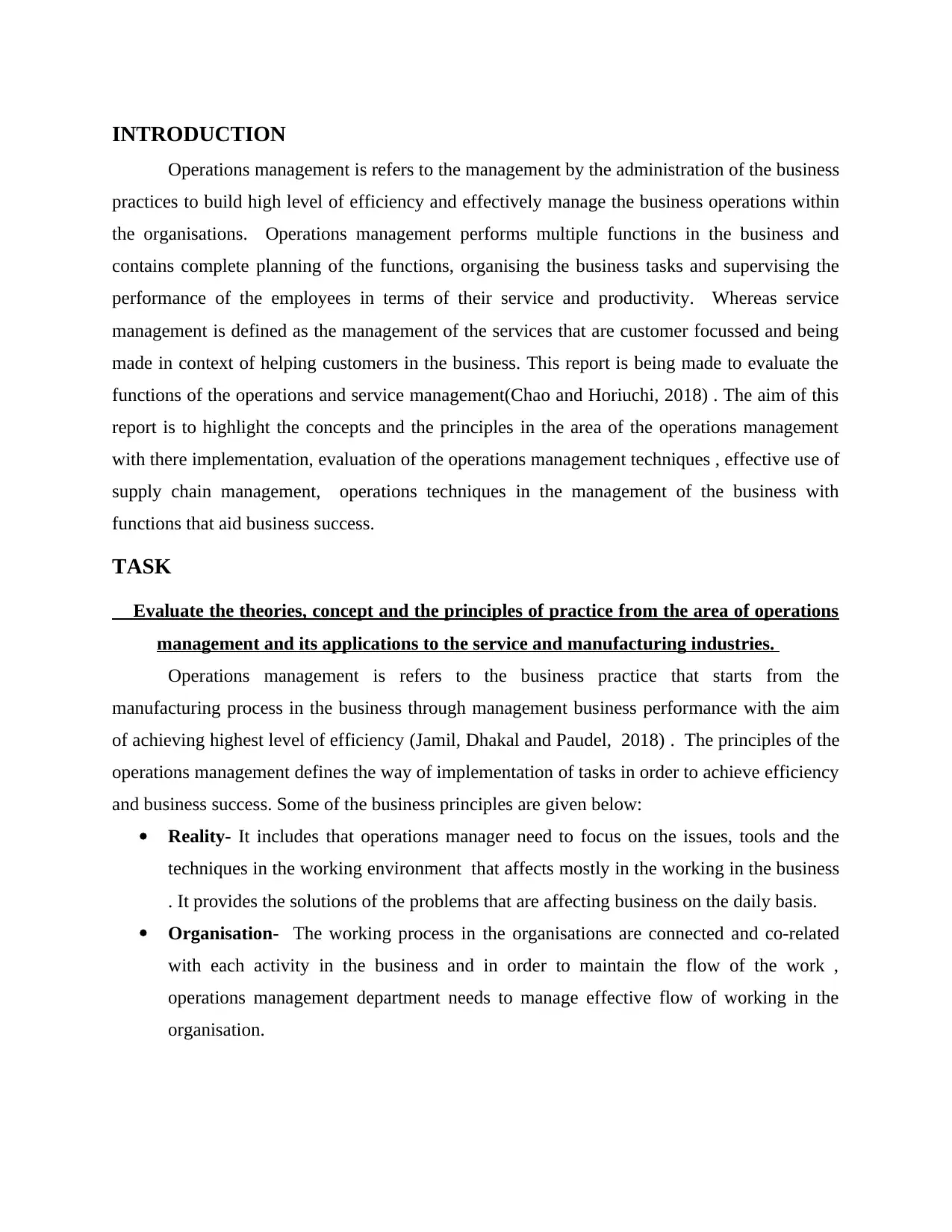
INTRODUCTION
Operations management is refers to the management by the administration of the business
practices to build high level of efficiency and effectively manage the business operations within
the organisations. Operations management performs multiple functions in the business and
contains complete planning of the functions, organising the business tasks and supervising the
performance of the employees in terms of their service and productivity. Whereas service
management is defined as the management of the services that are customer focussed and being
made in context of helping customers in the business. This report is being made to evaluate the
functions of the operations and service management(Chao and Horiuchi, 2018) . The aim of this
report is to highlight the concepts and the principles in the area of the operations management
with there implementation, evaluation of the operations management techniques , effective use of
supply chain management, operations techniques in the management of the business with
functions that aid business success.
TASK
Evaluate the theories, concept and the principles of practice from the area of operations
management and its applications to the service and manufacturing industries.
Operations management is refers to the business practice that starts from the
manufacturing process in the business through management business performance with the aim
of achieving highest level of efficiency (Jamil, Dhakal and Paudel, 2018) . The principles of the
operations management defines the way of implementation of tasks in order to achieve efficiency
and business success. Some of the business principles are given below:
Reality- It includes that operations manager need to focus on the issues, tools and the
techniques in the working environment that affects mostly in the working in the business
. It provides the solutions of the problems that are affecting business on the daily basis.
Organisation- The working process in the organisations are connected and co-related
with each activity in the business and in order to maintain the flow of the work ,
operations management department needs to manage effective flow of working in the
organisation.
Operations management is refers to the management by the administration of the business
practices to build high level of efficiency and effectively manage the business operations within
the organisations. Operations management performs multiple functions in the business and
contains complete planning of the functions, organising the business tasks and supervising the
performance of the employees in terms of their service and productivity. Whereas service
management is defined as the management of the services that are customer focussed and being
made in context of helping customers in the business. This report is being made to evaluate the
functions of the operations and service management(Chao and Horiuchi, 2018) . The aim of this
report is to highlight the concepts and the principles in the area of the operations management
with there implementation, evaluation of the operations management techniques , effective use of
supply chain management, operations techniques in the management of the business with
functions that aid business success.
TASK
Evaluate the theories, concept and the principles of practice from the area of operations
management and its applications to the service and manufacturing industries.
Operations management is refers to the business practice that starts from the
manufacturing process in the business through management business performance with the aim
of achieving highest level of efficiency (Jamil, Dhakal and Paudel, 2018) . The principles of the
operations management defines the way of implementation of tasks in order to achieve efficiency
and business success. Some of the business principles are given below:
Reality- It includes that operations manager need to focus on the issues, tools and the
techniques in the working environment that affects mostly in the working in the business
. It provides the solutions of the problems that are affecting business on the daily basis.
Organisation- The working process in the organisations are connected and co-related
with each activity in the business and in order to maintain the flow of the work ,
operations management department needs to manage effective flow of working in the
organisation.
⊘ This is a preview!⊘
Do you want full access?
Subscribe today to unlock all pages.

Trusted by 1+ million students worldwide
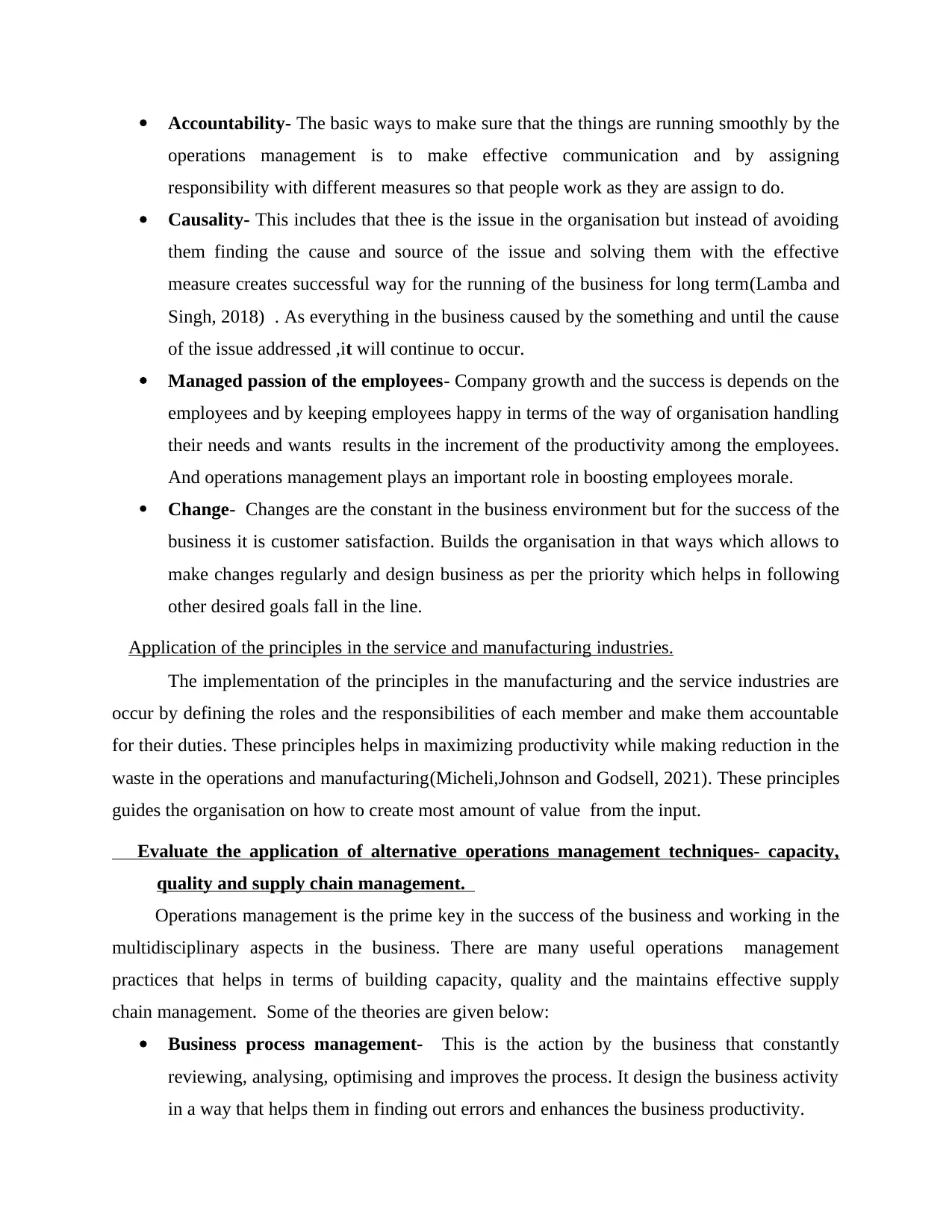
Accountability- The basic ways to make sure that the things are running smoothly by the
operations management is to make effective communication and by assigning
responsibility with different measures so that people work as they are assign to do.
Causality- This includes that thee is the issue in the organisation but instead of avoiding
them finding the cause and source of the issue and solving them with the effective
measure creates successful way for the running of the business for long term(Lamba and
Singh, 2018) . As everything in the business caused by the something and until the cause
of the issue addressed ,it will continue to occur.
Managed passion of the employees- Company growth and the success is depends on the
employees and by keeping employees happy in terms of the way of organisation handling
their needs and wants results in the increment of the productivity among the employees.
And operations management plays an important role in boosting employees morale.
Change- Changes are the constant in the business environment but for the success of the
business it is customer satisfaction. Builds the organisation in that ways which allows to
make changes regularly and design business as per the priority which helps in following
other desired goals fall in the line.
Application of the principles in the service and manufacturing industries.
The implementation of the principles in the manufacturing and the service industries are
occur by defining the roles and the responsibilities of each member and make them accountable
for their duties. These principles helps in maximizing productivity while making reduction in the
waste in the operations and manufacturing(Micheli,Johnson and Godsell, 2021). These principles
guides the organisation on how to create most amount of value from the input.
Evaluate the application of alternative operations management techniques- capacity,
quality and supply chain management.
Operations management is the prime key in the success of the business and working in the
multidisciplinary aspects in the business. There are many useful operations management
practices that helps in terms of building capacity, quality and the maintains effective supply
chain management. Some of the theories are given below:
Business process management- This is the action by the business that constantly
reviewing, analysing, optimising and improves the process. It design the business activity
in a way that helps them in finding out errors and enhances the business productivity.
operations management is to make effective communication and by assigning
responsibility with different measures so that people work as they are assign to do.
Causality- This includes that thee is the issue in the organisation but instead of avoiding
them finding the cause and source of the issue and solving them with the effective
measure creates successful way for the running of the business for long term(Lamba and
Singh, 2018) . As everything in the business caused by the something and until the cause
of the issue addressed ,it will continue to occur.
Managed passion of the employees- Company growth and the success is depends on the
employees and by keeping employees happy in terms of the way of organisation handling
their needs and wants results in the increment of the productivity among the employees.
And operations management plays an important role in boosting employees morale.
Change- Changes are the constant in the business environment but for the success of the
business it is customer satisfaction. Builds the organisation in that ways which allows to
make changes regularly and design business as per the priority which helps in following
other desired goals fall in the line.
Application of the principles in the service and manufacturing industries.
The implementation of the principles in the manufacturing and the service industries are
occur by defining the roles and the responsibilities of each member and make them accountable
for their duties. These principles helps in maximizing productivity while making reduction in the
waste in the operations and manufacturing(Micheli,Johnson and Godsell, 2021). These principles
guides the organisation on how to create most amount of value from the input.
Evaluate the application of alternative operations management techniques- capacity,
quality and supply chain management.
Operations management is the prime key in the success of the business and working in the
multidisciplinary aspects in the business. There are many useful operations management
practices that helps in terms of building capacity, quality and the maintains effective supply
chain management. Some of the theories are given below:
Business process management- This is the action by the business that constantly
reviewing, analysing, optimising and improves the process. It design the business activity
in a way that helps them in finding out errors and enhances the business productivity.
Paraphrase This Document
Need a fresh take? Get an instant paraphrase of this document with our AI Paraphraser
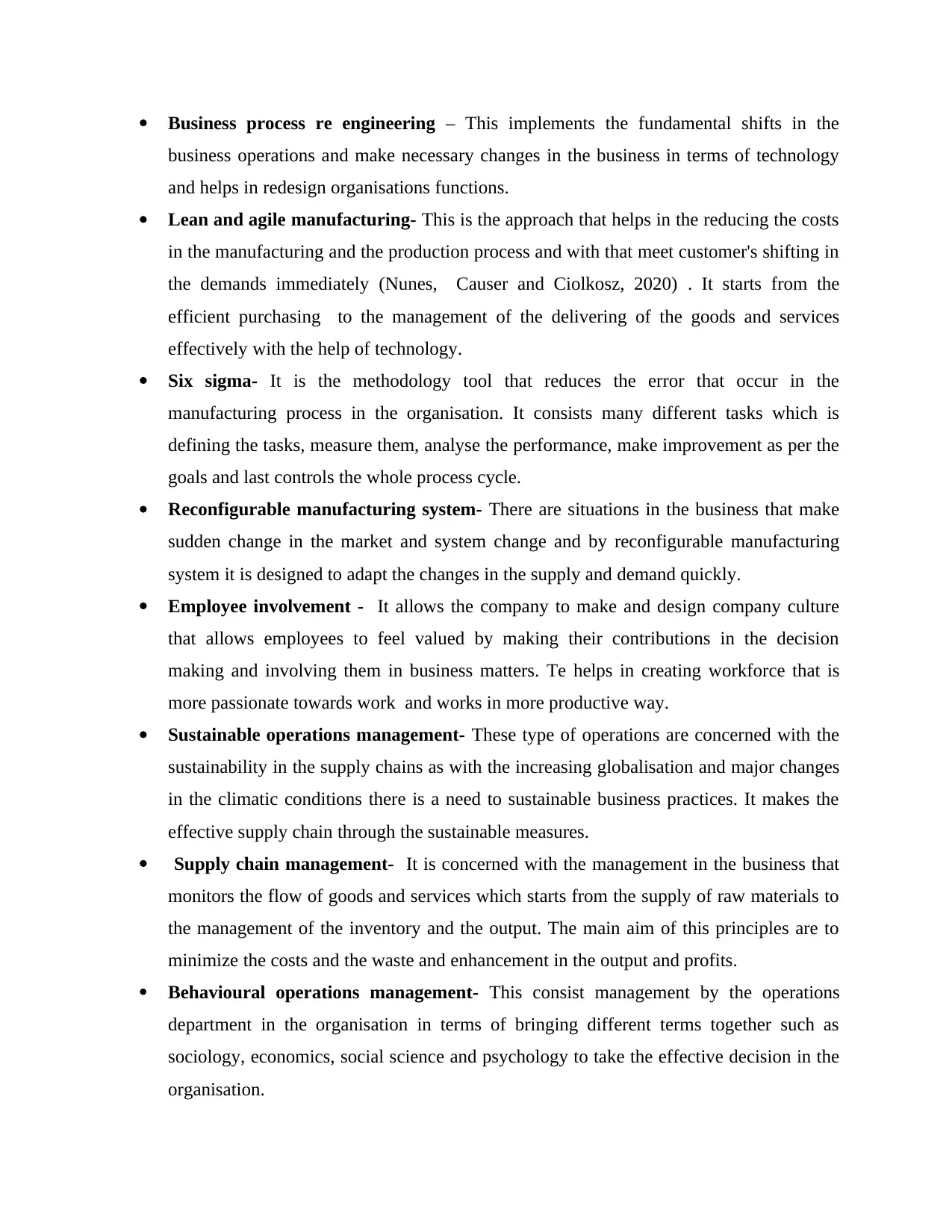
Business process re engineering – This implements the fundamental shifts in the
business operations and make necessary changes in the business in terms of technology
and helps in redesign organisations functions.
Lean and agile manufacturing- This is the approach that helps in the reducing the costs
in the manufacturing and the production process and with that meet customer's shifting in
the demands immediately (Nunes, Causer and Ciolkosz, 2020) . It starts from the
efficient purchasing to the management of the delivering of the goods and services
effectively with the help of technology.
Six sigma- It is the methodology tool that reduces the error that occur in the
manufacturing process in the organisation. It consists many different tasks which is
defining the tasks, measure them, analyse the performance, make improvement as per the
goals and last controls the whole process cycle.
Reconfigurable manufacturing system- There are situations in the business that make
sudden change in the market and system change and by reconfigurable manufacturing
system it is designed to adapt the changes in the supply and demand quickly.
Employee involvement - It allows the company to make and design company culture
that allows employees to feel valued by making their contributions in the decision
making and involving them in business matters. Te helps in creating workforce that is
more passionate towards work and works in more productive way.
Sustainable operations management- These type of operations are concerned with the
sustainability in the supply chains as with the increasing globalisation and major changes
in the climatic conditions there is a need to sustainable business practices. It makes the
effective supply chain through the sustainable measures.
Supply chain management- It is concerned with the management in the business that
monitors the flow of goods and services which starts from the supply of raw materials to
the management of the inventory and the output. The main aim of this principles are to
minimize the costs and the waste and enhancement in the output and profits.
Behavioural operations management- This consist management by the operations
department in the organisation in terms of bringing different terms together such as
sociology, economics, social science and psychology to take the effective decision in the
organisation.
business operations and make necessary changes in the business in terms of technology
and helps in redesign organisations functions.
Lean and agile manufacturing- This is the approach that helps in the reducing the costs
in the manufacturing and the production process and with that meet customer's shifting in
the demands immediately (Nunes, Causer and Ciolkosz, 2020) . It starts from the
efficient purchasing to the management of the delivering of the goods and services
effectively with the help of technology.
Six sigma- It is the methodology tool that reduces the error that occur in the
manufacturing process in the organisation. It consists many different tasks which is
defining the tasks, measure them, analyse the performance, make improvement as per the
goals and last controls the whole process cycle.
Reconfigurable manufacturing system- There are situations in the business that make
sudden change in the market and system change and by reconfigurable manufacturing
system it is designed to adapt the changes in the supply and demand quickly.
Employee involvement - It allows the company to make and design company culture
that allows employees to feel valued by making their contributions in the decision
making and involving them in business matters. Te helps in creating workforce that is
more passionate towards work and works in more productive way.
Sustainable operations management- These type of operations are concerned with the
sustainability in the supply chains as with the increasing globalisation and major changes
in the climatic conditions there is a need to sustainable business practices. It makes the
effective supply chain through the sustainable measures.
Supply chain management- It is concerned with the management in the business that
monitors the flow of goods and services which starts from the supply of raw materials to
the management of the inventory and the output. The main aim of this principles are to
minimize the costs and the waste and enhancement in the output and profits.
Behavioural operations management- This consist management by the operations
department in the organisation in terms of bringing different terms together such as
sociology, economics, social science and psychology to take the effective decision in the
organisation.
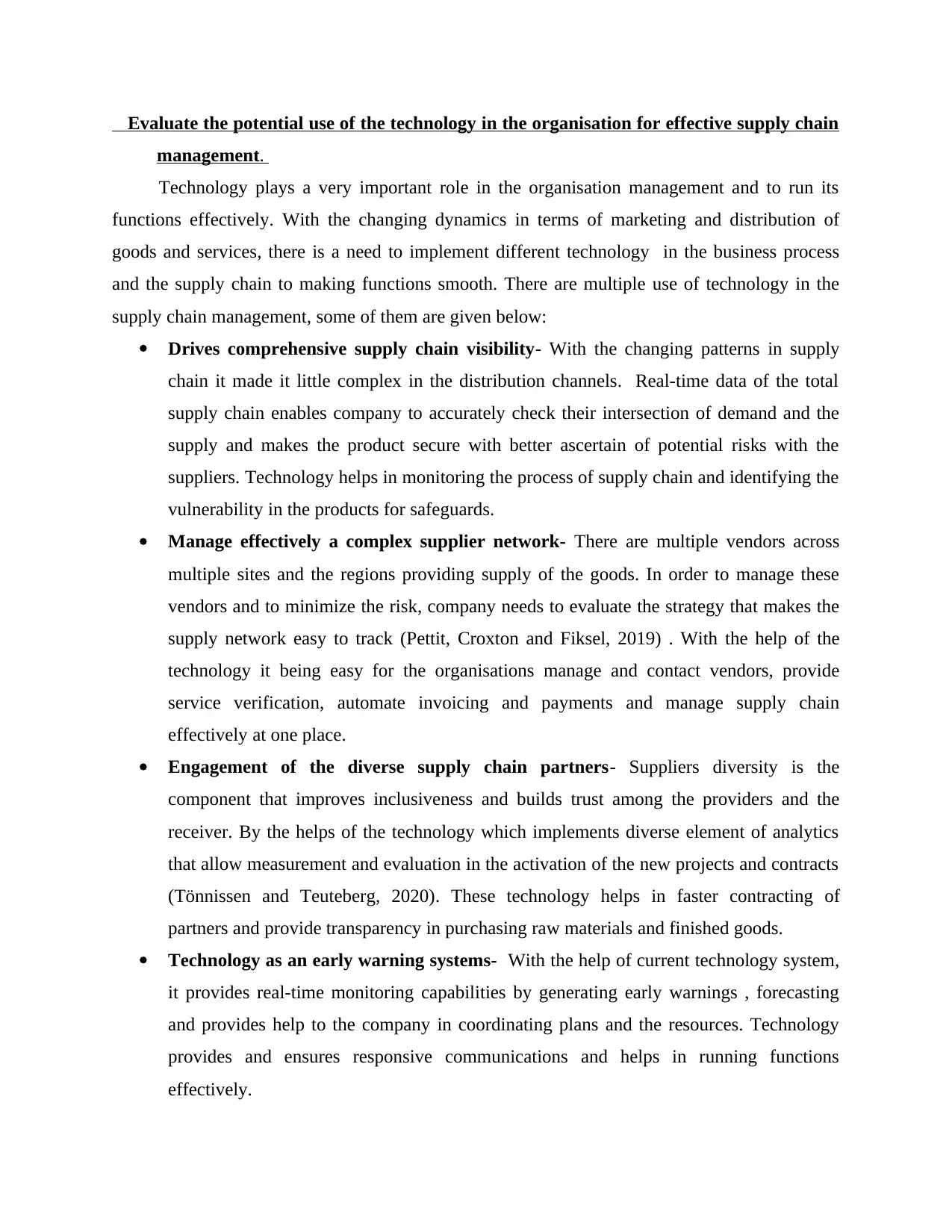
Evaluate the potential use of the technology in the organisation for effective supply chain
management.
Technology plays a very important role in the organisation management and to run its
functions effectively. With the changing dynamics in terms of marketing and distribution of
goods and services, there is a need to implement different technology in the business process
and the supply chain to making functions smooth. There are multiple use of technology in the
supply chain management, some of them are given below:
Drives comprehensive supply chain visibility- With the changing patterns in supply
chain it made it little complex in the distribution channels. Real-time data of the total
supply chain enables company to accurately check their intersection of demand and the
supply and makes the product secure with better ascertain of potential risks with the
suppliers. Technology helps in monitoring the process of supply chain and identifying the
vulnerability in the products for safeguards.
Manage effectively a complex supplier network- There are multiple vendors across
multiple sites and the regions providing supply of the goods. In order to manage these
vendors and to minimize the risk, company needs to evaluate the strategy that makes the
supply network easy to track (Pettit, Croxton and Fiksel, 2019) . With the help of the
technology it being easy for the organisations manage and contact vendors, provide
service verification, automate invoicing and payments and manage supply chain
effectively at one place.
Engagement of the diverse supply chain partners- Suppliers diversity is the
component that improves inclusiveness and builds trust among the providers and the
receiver. By the helps of the technology which implements diverse element of analytics
that allow measurement and evaluation in the activation of the new projects and contracts
(Tönnissen and Teuteberg, 2020). These technology helps in faster contracting of
partners and provide transparency in purchasing raw materials and finished goods.
Technology as an early warning systems- With the help of current technology system,
it provides real-time monitoring capabilities by generating early warnings , forecasting
and provides help to the company in coordinating plans and the resources. Technology
provides and ensures responsive communications and helps in running functions
effectively.
management.
Technology plays a very important role in the organisation management and to run its
functions effectively. With the changing dynamics in terms of marketing and distribution of
goods and services, there is a need to implement different technology in the business process
and the supply chain to making functions smooth. There are multiple use of technology in the
supply chain management, some of them are given below:
Drives comprehensive supply chain visibility- With the changing patterns in supply
chain it made it little complex in the distribution channels. Real-time data of the total
supply chain enables company to accurately check their intersection of demand and the
supply and makes the product secure with better ascertain of potential risks with the
suppliers. Technology helps in monitoring the process of supply chain and identifying the
vulnerability in the products for safeguards.
Manage effectively a complex supplier network- There are multiple vendors across
multiple sites and the regions providing supply of the goods. In order to manage these
vendors and to minimize the risk, company needs to evaluate the strategy that makes the
supply network easy to track (Pettit, Croxton and Fiksel, 2019) . With the help of the
technology it being easy for the organisations manage and contact vendors, provide
service verification, automate invoicing and payments and manage supply chain
effectively at one place.
Engagement of the diverse supply chain partners- Suppliers diversity is the
component that improves inclusiveness and builds trust among the providers and the
receiver. By the helps of the technology which implements diverse element of analytics
that allow measurement and evaluation in the activation of the new projects and contracts
(Tönnissen and Teuteberg, 2020). These technology helps in faster contracting of
partners and provide transparency in purchasing raw materials and finished goods.
Technology as an early warning systems- With the help of current technology system,
it provides real-time monitoring capabilities by generating early warnings , forecasting
and provides help to the company in coordinating plans and the resources. Technology
provides and ensures responsive communications and helps in running functions
effectively.
⊘ This is a preview!⊘
Do you want full access?
Subscribe today to unlock all pages.

Trusted by 1+ million students worldwide
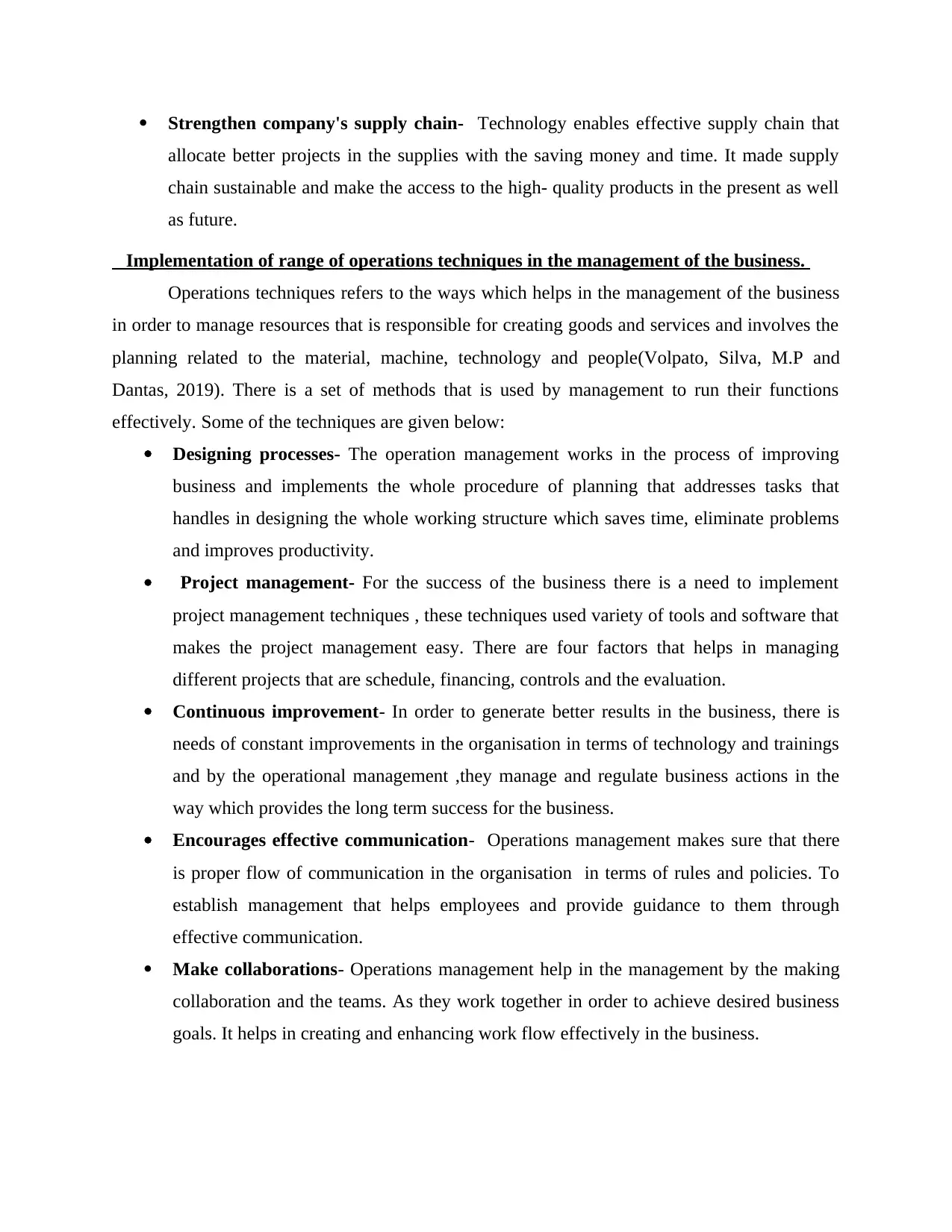
Strengthen company's supply chain- Technology enables effective supply chain that
allocate better projects in the supplies with the saving money and time. It made supply
chain sustainable and make the access to the high- quality products in the present as well
as future.
Implementation of range of operations techniques in the management of the business.
Operations techniques refers to the ways which helps in the management of the business
in order to manage resources that is responsible for creating goods and services and involves the
planning related to the material, machine, technology and people(Volpato, Silva, M.P and
Dantas, 2019). There is a set of methods that is used by management to run their functions
effectively. Some of the techniques are given below:
Designing processes- The operation management works in the process of improving
business and implements the whole procedure of planning that addresses tasks that
handles in designing the whole working structure which saves time, eliminate problems
and improves productivity.
Project management- For the success of the business there is a need to implement
project management techniques , these techniques used variety of tools and software that
makes the project management easy. There are four factors that helps in managing
different projects that are schedule, financing, controls and the evaluation.
Continuous improvement- In order to generate better results in the business, there is
needs of constant improvements in the organisation in terms of technology and trainings
and by the operational management ,they manage and regulate business actions in the
way which provides the long term success for the business.
Encourages effective communication- Operations management makes sure that there
is proper flow of communication in the organisation in terms of rules and policies. To
establish management that helps employees and provide guidance to them through
effective communication.
Make collaborations- Operations management help in the management by the making
collaboration and the teams. As they work together in order to achieve desired business
goals. It helps in creating and enhancing work flow effectively in the business.
allocate better projects in the supplies with the saving money and time. It made supply
chain sustainable and make the access to the high- quality products in the present as well
as future.
Implementation of range of operations techniques in the management of the business.
Operations techniques refers to the ways which helps in the management of the business
in order to manage resources that is responsible for creating goods and services and involves the
planning related to the material, machine, technology and people(Volpato, Silva, M.P and
Dantas, 2019). There is a set of methods that is used by management to run their functions
effectively. Some of the techniques are given below:
Designing processes- The operation management works in the process of improving
business and implements the whole procedure of planning that addresses tasks that
handles in designing the whole working structure which saves time, eliminate problems
and improves productivity.
Project management- For the success of the business there is a need to implement
project management techniques , these techniques used variety of tools and software that
makes the project management easy. There are four factors that helps in managing
different projects that are schedule, financing, controls and the evaluation.
Continuous improvement- In order to generate better results in the business, there is
needs of constant improvements in the organisation in terms of technology and trainings
and by the operational management ,they manage and regulate business actions in the
way which provides the long term success for the business.
Encourages effective communication- Operations management makes sure that there
is proper flow of communication in the organisation in terms of rules and policies. To
establish management that helps employees and provide guidance to them through
effective communication.
Make collaborations- Operations management help in the management by the making
collaboration and the teams. As they work together in order to achieve desired business
goals. It helps in creating and enhancing work flow effectively in the business.
Paraphrase This Document
Need a fresh take? Get an instant paraphrase of this document with our AI Paraphraser
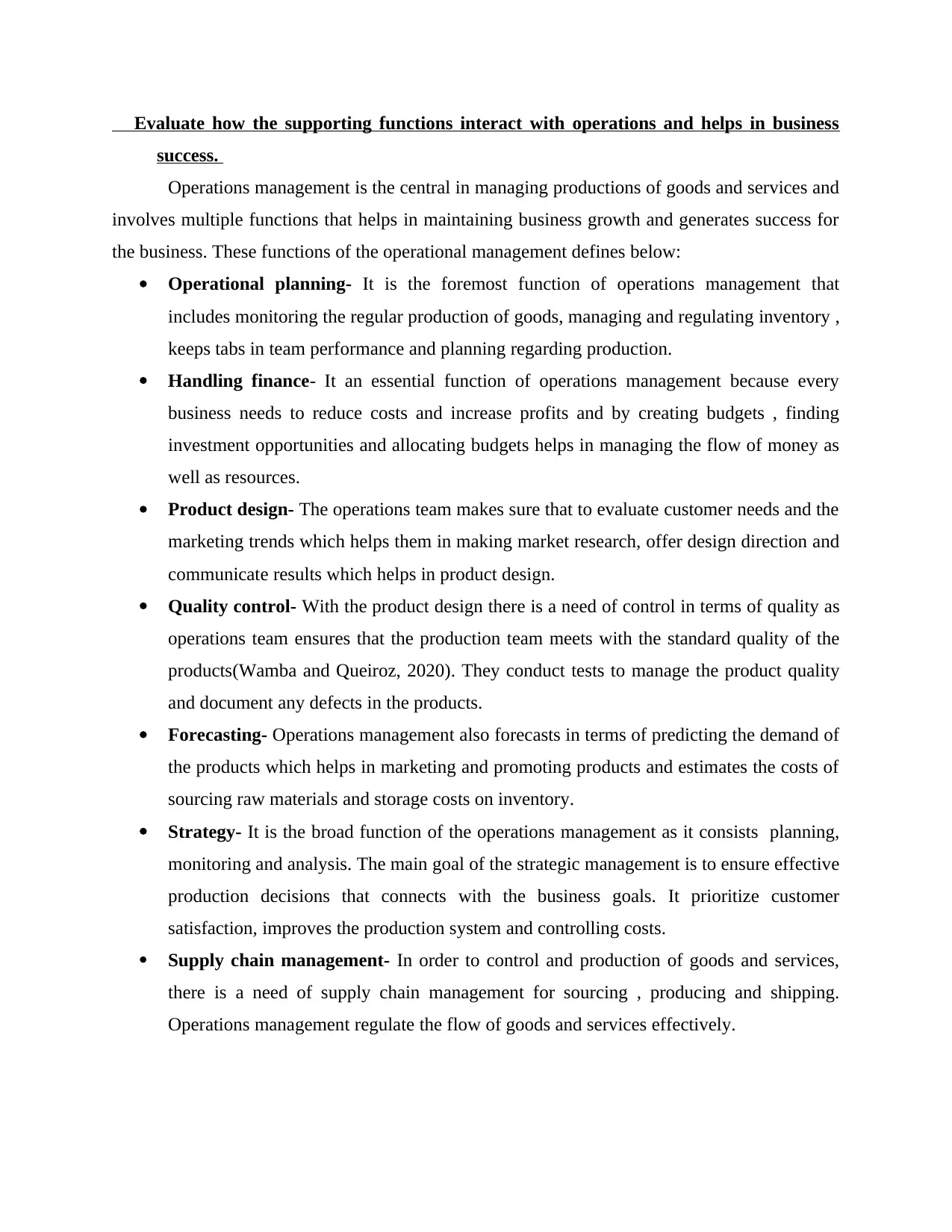
Evaluate how the supporting functions interact with operations and helps in business
success.
Operations management is the central in managing productions of goods and services and
involves multiple functions that helps in maintaining business growth and generates success for
the business. These functions of the operational management defines below:
Operational planning- It is the foremost function of operations management that
includes monitoring the regular production of goods, managing and regulating inventory ,
keeps tabs in team performance and planning regarding production.
Handling finance- It an essential function of operations management because every
business needs to reduce costs and increase profits and by creating budgets , finding
investment opportunities and allocating budgets helps in managing the flow of money as
well as resources.
Product design- The operations team makes sure that to evaluate customer needs and the
marketing trends which helps them in making market research, offer design direction and
communicate results which helps in product design.
Quality control- With the product design there is a need of control in terms of quality as
operations team ensures that the production team meets with the standard quality of the
products(Wamba and Queiroz, 2020). They conduct tests to manage the product quality
and document any defects in the products.
Forecasting- Operations management also forecasts in terms of predicting the demand of
the products which helps in marketing and promoting products and estimates the costs of
sourcing raw materials and storage costs on inventory.
Strategy- It is the broad function of the operations management as it consists planning,
monitoring and analysis. The main goal of the strategic management is to ensure effective
production decisions that connects with the business goals. It prioritize customer
satisfaction, improves the production system and controlling costs.
Supply chain management- In order to control and production of goods and services,
there is a need of supply chain management for sourcing , producing and shipping.
Operations management regulate the flow of goods and services effectively.
success.
Operations management is the central in managing productions of goods and services and
involves multiple functions that helps in maintaining business growth and generates success for
the business. These functions of the operational management defines below:
Operational planning- It is the foremost function of operations management that
includes monitoring the regular production of goods, managing and regulating inventory ,
keeps tabs in team performance and planning regarding production.
Handling finance- It an essential function of operations management because every
business needs to reduce costs and increase profits and by creating budgets , finding
investment opportunities and allocating budgets helps in managing the flow of money as
well as resources.
Product design- The operations team makes sure that to evaluate customer needs and the
marketing trends which helps them in making market research, offer design direction and
communicate results which helps in product design.
Quality control- With the product design there is a need of control in terms of quality as
operations team ensures that the production team meets with the standard quality of the
products(Wamba and Queiroz, 2020). They conduct tests to manage the product quality
and document any defects in the products.
Forecasting- Operations management also forecasts in terms of predicting the demand of
the products which helps in marketing and promoting products and estimates the costs of
sourcing raw materials and storage costs on inventory.
Strategy- It is the broad function of the operations management as it consists planning,
monitoring and analysis. The main goal of the strategic management is to ensure effective
production decisions that connects with the business goals. It prioritize customer
satisfaction, improves the production system and controlling costs.
Supply chain management- In order to control and production of goods and services,
there is a need of supply chain management for sourcing , producing and shipping.
Operations management regulate the flow of goods and services effectively.
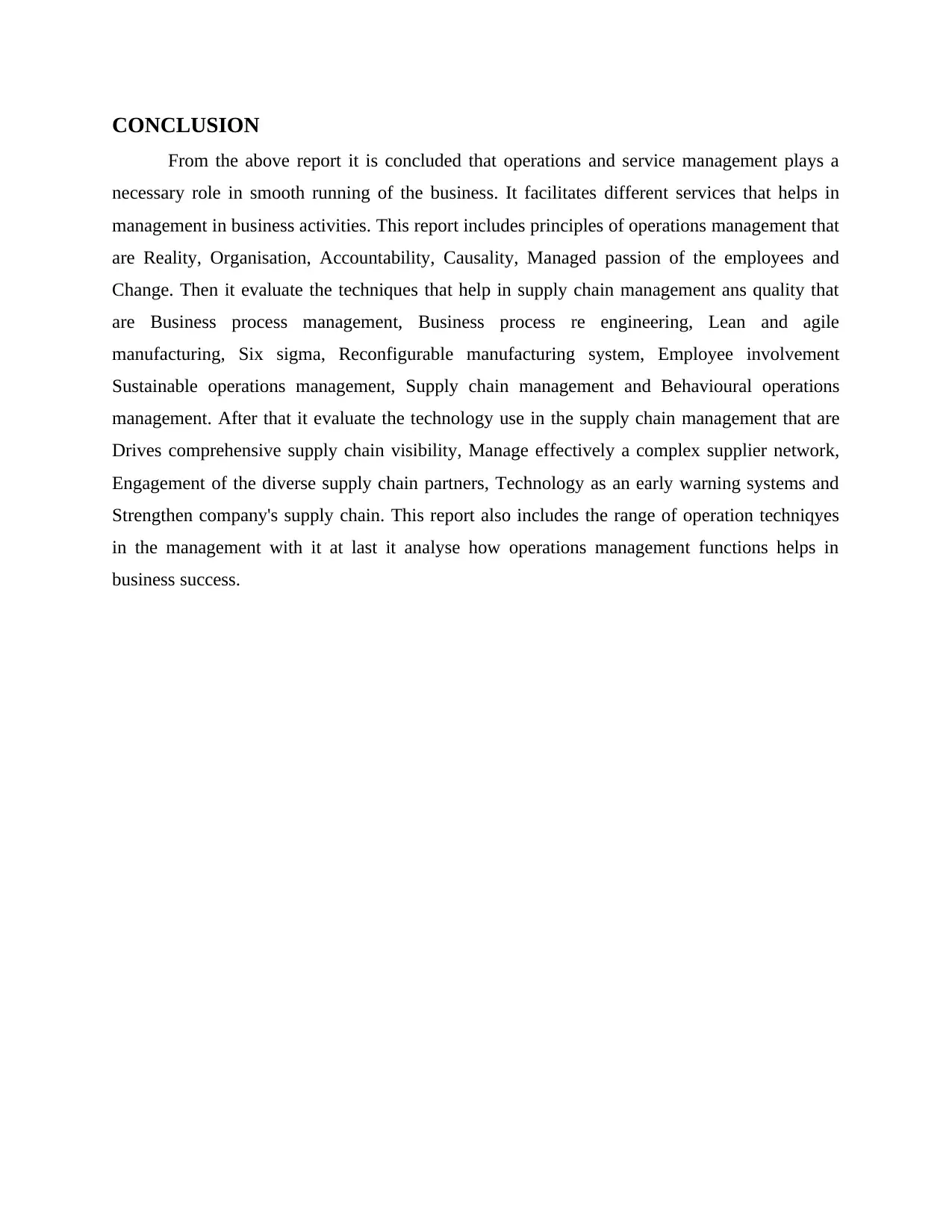
CONCLUSION
From the above report it is concluded that operations and service management plays a
necessary role in smooth running of the business. It facilitates different services that helps in
management in business activities. This report includes principles of operations management that
are Reality, Organisation, Accountability, Causality, Managed passion of the employees and
Change. Then it evaluate the techniques that help in supply chain management ans quality that
are Business process management, Business process re engineering, Lean and agile
manufacturing, Six sigma, Reconfigurable manufacturing system, Employee involvement
Sustainable operations management, Supply chain management and Behavioural operations
management. After that it evaluate the technology use in the supply chain management that are
Drives comprehensive supply chain visibility, Manage effectively a complex supplier network,
Engagement of the diverse supply chain partners, Technology as an early warning systems and
Strengthen company's supply chain. This report also includes the range of operation techniqyes
in the management with it at last it analyse how operations management functions helps in
business success.
From the above report it is concluded that operations and service management plays a
necessary role in smooth running of the business. It facilitates different services that helps in
management in business activities. This report includes principles of operations management that
are Reality, Organisation, Accountability, Causality, Managed passion of the employees and
Change. Then it evaluate the techniques that help in supply chain management ans quality that
are Business process management, Business process re engineering, Lean and agile
manufacturing, Six sigma, Reconfigurable manufacturing system, Employee involvement
Sustainable operations management, Supply chain management and Behavioural operations
management. After that it evaluate the technology use in the supply chain management that are
Drives comprehensive supply chain visibility, Manage effectively a complex supplier network,
Engagement of the diverse supply chain partners, Technology as an early warning systems and
Strengthen company's supply chain. This report also includes the range of operation techniqyes
in the management with it at last it analyse how operations management functions helps in
business success.
⊘ This is a preview!⊘
Do you want full access?
Subscribe today to unlock all pages.

Trusted by 1+ million students worldwide
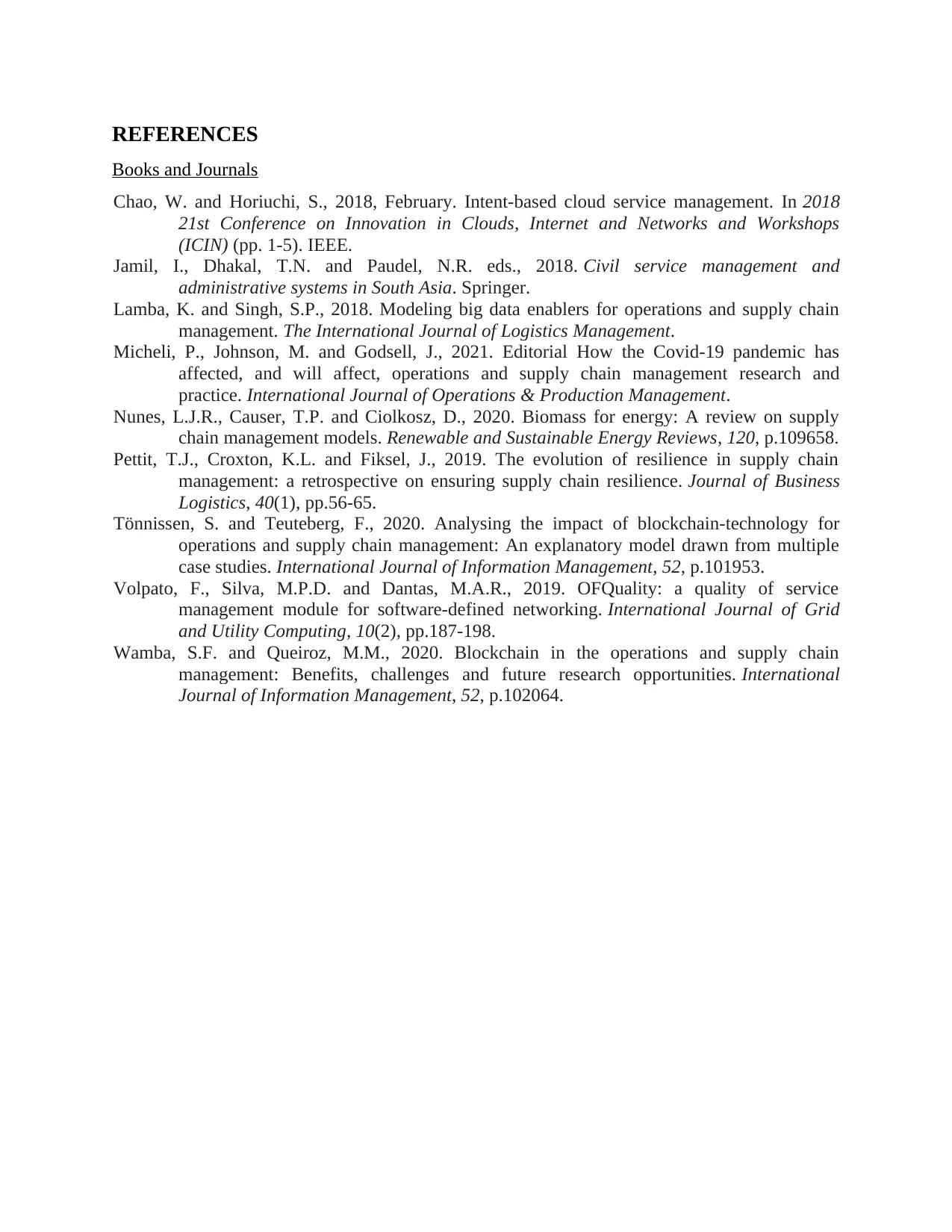
REFERENCES
Books and Journals
Chao, W. and Horiuchi, S., 2018, February. Intent-based cloud service management. In 2018
21st Conference on Innovation in Clouds, Internet and Networks and Workshops
(ICIN) (pp. 1-5). IEEE.
Jamil, I., Dhakal, T.N. and Paudel, N.R. eds., 2018. Civil service management and
administrative systems in South Asia. Springer.
Lamba, K. and Singh, S.P., 2018. Modeling big data enablers for operations and supply chain
management. The International Journal of Logistics Management.
Micheli, P., Johnson, M. and Godsell, J., 2021. Editorial How the Covid-19 pandemic has
affected, and will affect, operations and supply chain management research and
practice. International Journal of Operations & Production Management.
Nunes, L.J.R., Causer, T.P. and Ciolkosz, D., 2020. Biomass for energy: A review on supply
chain management models. Renewable and Sustainable Energy Reviews, 120, p.109658.
Pettit, T.J., Croxton, K.L. and Fiksel, J., 2019. The evolution of resilience in supply chain
management: a retrospective on ensuring supply chain resilience. Journal of Business
Logistics, 40(1), pp.56-65.
Tönnissen, S. and Teuteberg, F., 2020. Analysing the impact of blockchain-technology for
operations and supply chain management: An explanatory model drawn from multiple
case studies. International Journal of Information Management, 52, p.101953.
Volpato, F., Silva, M.P.D. and Dantas, M.A.R., 2019. OFQuality: a quality of service
management module for software-defined networking. International Journal of Grid
and Utility Computing, 10(2), pp.187-198.
Wamba, S.F. and Queiroz, M.M., 2020. Blockchain in the operations and supply chain
management: Benefits, challenges and future research opportunities. International
Journal of Information Management, 52, p.102064.
Books and Journals
Chao, W. and Horiuchi, S., 2018, February. Intent-based cloud service management. In 2018
21st Conference on Innovation in Clouds, Internet and Networks and Workshops
(ICIN) (pp. 1-5). IEEE.
Jamil, I., Dhakal, T.N. and Paudel, N.R. eds., 2018. Civil service management and
administrative systems in South Asia. Springer.
Lamba, K. and Singh, S.P., 2018. Modeling big data enablers for operations and supply chain
management. The International Journal of Logistics Management.
Micheli, P., Johnson, M. and Godsell, J., 2021. Editorial How the Covid-19 pandemic has
affected, and will affect, operations and supply chain management research and
practice. International Journal of Operations & Production Management.
Nunes, L.J.R., Causer, T.P. and Ciolkosz, D., 2020. Biomass for energy: A review on supply
chain management models. Renewable and Sustainable Energy Reviews, 120, p.109658.
Pettit, T.J., Croxton, K.L. and Fiksel, J., 2019. The evolution of resilience in supply chain
management: a retrospective on ensuring supply chain resilience. Journal of Business
Logistics, 40(1), pp.56-65.
Tönnissen, S. and Teuteberg, F., 2020. Analysing the impact of blockchain-technology for
operations and supply chain management: An explanatory model drawn from multiple
case studies. International Journal of Information Management, 52, p.101953.
Volpato, F., Silva, M.P.D. and Dantas, M.A.R., 2019. OFQuality: a quality of service
management module for software-defined networking. International Journal of Grid
and Utility Computing, 10(2), pp.187-198.
Wamba, S.F. and Queiroz, M.M., 2020. Blockchain in the operations and supply chain
management: Benefits, challenges and future research opportunities. International
Journal of Information Management, 52, p.102064.
1 out of 10
Related Documents
Your All-in-One AI-Powered Toolkit for Academic Success.
+13062052269
info@desklib.com
Available 24*7 on WhatsApp / Email
![[object Object]](/_next/static/media/star-bottom.7253800d.svg)
Unlock your academic potential
Copyright © 2020–2025 A2Z Services. All Rights Reserved. Developed and managed by ZUCOL.




